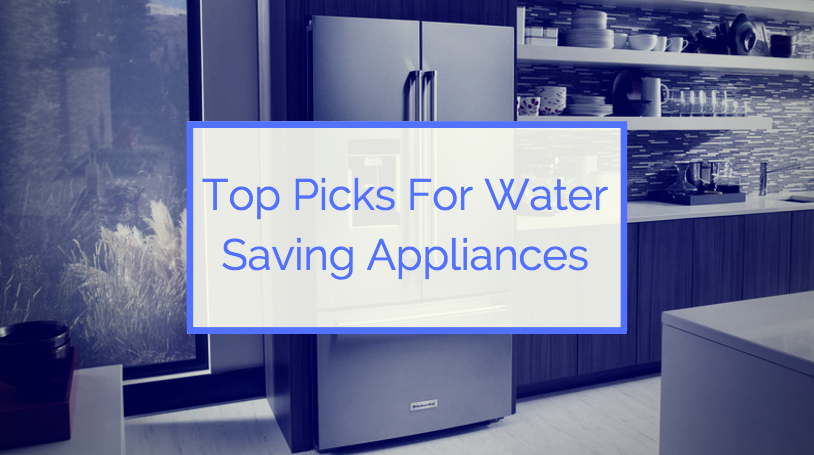We all know to save water by turning off the faucet, rather than letting it run, and taking shorter showers, but how often do we think about the amount of water our household appliances use? Water saving appliances are a one-time investment that make saving water an effortless and automatic part of your daily routine. You might be surprised how much water (and money) some of your appliances are washing down the drain, but it can be hard to know where to start when converting to a more water- and energy-efficient home. Luckily, we at Benjamin Franklin Plumbing in the Bay Area have compiled a list of some of the top products and most important numbers to look for as you shop for water saving appliances.
Best Water Efficient Dishwashers
First, just having and using a dishwasher will save a significant amount of water. Washing a load of dishes by hand can use around 20 gallons of water, while water- and energy-efficient dishwashers use as little as 4.5 gallons to wash the same load. As with many appliances, dishwashers have evolved in recent years to use both water and energy more efficiently, so using a dishwasher from before 1994 could be wasting as much as 10 gallons of water per load.
Some improvements that have made modern dishwashers more efficient include:
• Soil Sensors detect just how dirty the dishes are throughout the cycle, and then use this information to provide an effective clean using the least water and energy possible.
• Improved Filtration Systems remove washed-off food debris more effectively to prevent re-dirtying the dishes and allow for a more efficient use of water and detergent.
• Innovative Dish Racks position dishes for easy, thorough cleaning.
• Efficient Jets use less energy and water to spray the dishes with water and detergent, resulting in a deep clean with less waste.
• Better Temperature Control allows for greater control over the amount of energy used, and can disinfect dishes when needed.
In general, you can expect to spend between $1,000 and $1,500 on a high-quality, energy efficient dishwasher, though some models sell for as little as $700, and those with advanced features can cost quite a bit more. Look for the Energy Star label on prospective dishwashers; this indicates that the system uses both water and energy more efficiently than the industry standards. Most major brands have multiple models that meet these criteria.
Washing Your Clothes with Less Water
What’s the easiest way to save on laundry day? Invest in a clothes washing and drying system that uses water and energy efficiently. In general, a simple guideline is that front load washers are significantly more water and energy-efficient than their top loading counterparts, as they can more effectively use gravity in the washing process. Top load clothes washers with agitators are still the top selling type of washer in the United States, but these old-fashioned models may use up to 27 gallons of water per load of laundry. Standard washers today average about 23 gallons per load, while the best water efficient clothes washers use only 13 gallons. Again, a good guideline is to look for washers that are Energy Star certified, as these models use 45% less water than standard models, as well as 25% less energy.
Clothes dryers do not use water, but they suck up energy and can quickly raise the cost of electricity or gas. A more efficient front load washer can decrease the energy you use on drying clothes, as its spin cycle will more effectively remove the water from the laundry. Of course, the most sustainable approach is to forego the dryer altogether and hang your clothes to dry, limiting dryer use to 10 minutes to eliminate wrinkles. The best energy efficient clothes dryers come equipped with moisture sensors that will cause the unit to automatically power off when the clothes are dry. Dryers powered by gas are also much more efficient than those powered electrically.
Save Energy and Water with Your Refrigerator
Refrigerators earning the Energy Star rating are at least 20% more energy efficient than their standard counterparts. Typically, models with the freezer on top use energy more efficiently than side-by-side or freezer-on-bottom fridges, due in part to the difference in volume. The more cubic feet of space in a refrigerator, the more energy it takes to cool, and refrigerator capacities have been on the rise in recent decades. One of the smartest energy saving moves a small household can make is purchasing a refrigerator just big enough rather than larger than is needed.
To make your fridge the best water efficient refrigerator it can be, consider keeping filled water containers in your fridge and/or freezer. If your fridge isn’t filled to capacity with food items, it will help save energy by stabilizing the internal temperature, which can fluctuate rapidly when a fridge is not full. It will also ensure that you always have cold drinking water on hand. Save water and energy by making the most of your refrigerator.
Benjamin Franklin Plumbing Bay Area
If you’re on your way to a more water efficient and sustainable home, let us help with the installation and maintenance of the appliances you’ll need.





